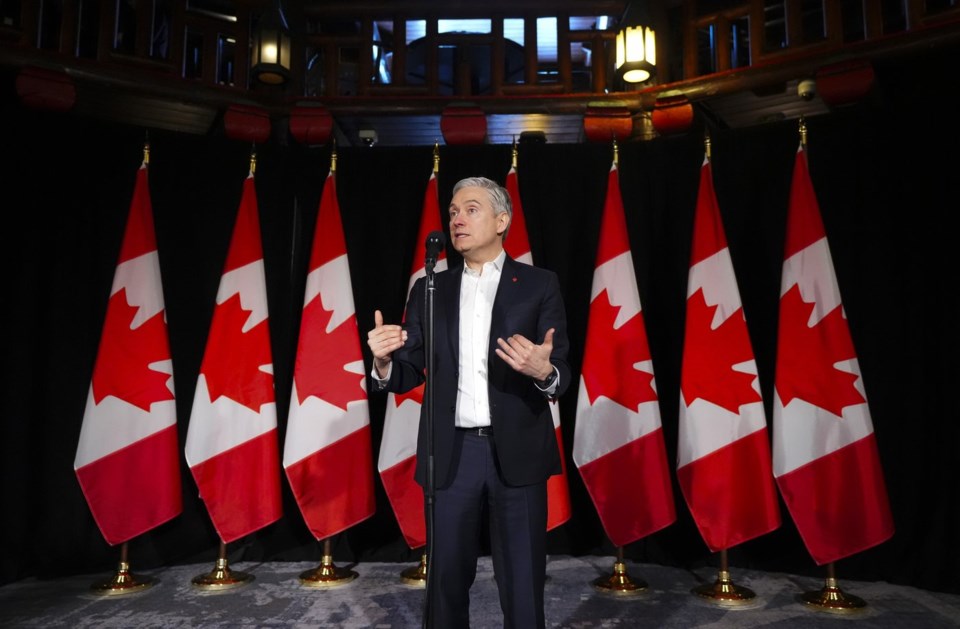WASHINGTON — Canadian officials are adopting a different tone after President Donald Trump ordered a study of the United States' trade relationship with Canada, pushing the threat of devastating tariffs down the road — temporarily.
"We need to move from a defensive position to offensive in the sense that we have a lot of good things to put on the table in that discussion," Industry Minister François-Philippe Champagne said at the cabinet retreat in Montebello, Que., on Tuesday.
Trump signed the America First Trade Policy after his return to the Oval Office Monday evening, providing Ottawa with some insights into his tariff agenda after months of political anxiety.
The memorandum orders multiple federal agencies to study trade policies and trade deficits. It directs the secretary of commerce and the secretary of homeland security to assess migration and fentanyl flows from Canada, Mexico and China and recommend "appropriate trade and national security measures to resolve that emergency."
It also signalled the U.S. trade representative to start consultations around the Canada-U.S.-Mexico Agreement and "make recommendations regarding the United States’ participation in the agreement."
The move ostensibly gives Canada more time and information to safeguard against Trump's promised 25 per cent across-the-board tariffs.
But Trump wasn't backing away, repeatedly suggesting he might hit Canada and Mexico with the tariffs on Feb. 1. It's not clear if that date holds any significance; Trump's order says that the report on trade with Canada is not due until April 1.
Kirsten Hillman, Canada's ambassador to the U.S., said the memorandum provides Canadian officials with a framework and key department contacts to allow them to make the case against the tariffs.
"We have now moved from a more abstract discussion with the Trump administration to a very concrete discussion," Hillman said at the cabinet retreat. "That document lays out priorities, it lays out areas of study that are very important to him for his fulfilment of his trade and economic agenda. It’s very detailed."
Trump remains concerned about America's border security, Hillman said. She cautioned people not to focus on Trump's choice of words, which included calling Canada "a very bad abuser" in relation to migrants and illegal drugs crossing into the United States.
It is a distraction tactic, she said, and Canada should instead look to where Trump's priorities intersect with those of Canada in areas like energy, trade and Arctic security.
Some officials and experts have suggested the damaging duties are part of Trump's strategy to rattle Canada and Mexico ahead of a mandatory 2026 review of the trilateral trade pact.
The negotiation of CUSMA, commonly dubbed “the new NAFTA,” took place during Trump's first administration. During those negotiations, the Republican president also promised massive tariffs on the Canadian auto sector — which never materialized — and put duties on steel and aluminum.
When questioned by reporters Tuesday evening, Trump denied the recent threat of tariffs was part of a plan to expedite negotiations of the agreement, saying "it has nothing to do with that."
"Both of them, Canada very much so, they've allowed millions and millions of people to come into our country that shouldn't be here," Trump said, also claiming the volume of fentanyl coming through Canada was "massive."
U.S. Customs and Border Protection has reported that nearly 10,000 kilograms of fentanyl was seized at American borders between October 2023 to September 2024 but only 20 kilograms of that was at the Canada-U.S. border. During the same time frame, 2.9 million people were apprehended and less than 200,000 came from Canada.
The debate over Canada's options for retaliatory tariffs has opened up divisions among federal and provincial leaders.
Ontario Premier Doug Ford initially suggested cutting off energy flows to the U.S. but has since appeared on American news programs promoting a "Fortress Am-Can" strategy intended to deepen the resource alliance between the two countries.
Alberta Premier Danielle Smith caused controversy last week when she refused to endorse a joint statement with the other premiers and Prime Minister Justin Trudeau that said every possible countermeasure would be on the table.
Premier Smith, who was in Washington for Trump's inauguration, said Monday that Canada can form a "perfect partnership" with the U.S. to provide oil and gas at stable prices, allowing the Americans to focus on boosting their own energy exports.
Trudeau will meet virtually with premiers Wednesday.
While the prime minister said again Tuesday that every retaliatory option remains on the table, his ministers and Hillman have turned their focus to how Canada can support some of the Trump administration's goals.
Champagne, who attended Trump's swearing-in ceremony on Capitol Hill Monday, said he reminded American lawmakers and leaders of the role Canada plays in supply chain resiliency, particularly for the critical minerals and semiconductors needed by the defence sector.
“Let’s not look at threats but opportunities," he said.
“I don’t know anything that the Americans buy from Canada by politeness," he added. "They buy from Canada because they need it.”
This report by The Canadian Press was first published Jan. 21, 2025.
Kelly Geraldine Malone, The Canadian Press

